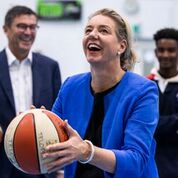New 24 hour movement guidelines released for children five and up

The new Australian 24-Hour Movement Guidelines for Children (5 to 13 years) have been launched today in Canberra by Australian Minister for Sport, Bridget McKenzie, and Professor Tony Okely, of the University of Wollongong (UOW).
The guidelines will be of interest to those working with children in outside school hours care (OSHC) programs, providing care for older children in family day care (FDC), and to educators of younger children who are called on to offer advice and support to families.
The Guidelines recommend no more than two hours of sedentary recreational screen time per day, alongside 60 minutes of moderate to vigorous physical activity. The guidelines make a distinction between recreational screen time and the use of electronic media for educational purposes, calling on parents to be mindful of setting a good example when it comes to their own screen-based activities.
Experts from across Australia were consulted on the development of the guidelines, which have been designed to give parents, educators and carers practical advice on healthy daily practice for children and young people.
Key recommendations include that children and young people:
- participate in a range of physical activities
- get good quality sleep
- limit screen time and prolonged sitting
Professor Okely, who heads up the early childhood teaching, research and community engagement initiative, Early Start at UOW, said that while the guidelines specify at least 60 minutes, more is better.
“If I could recommend a ‘magic pill’ to promote health among children and young people it would be physical activity. It has positive effects on all areas of health. Importantly, it’s fun to do, you can do it with friends, and you feel great afterwards,” Professor Okely said.
He defined moderate to vigorous activity as “any movement which uses large muscle groups and makes your heart beat faster” such as organised sports, dancing, walking to and from school, going to the gym, swimming, and active play and recreation.
Recent data indicates that less than one quarter (22 per cent) of young people meet the physical activity guidelines. Approximately 40 per cent of children meet the sedentary recreational screen time guideline of less than two hours per day.
The guidelines have not been updated since 2012, and, since the previous guidelines, the use and popularity of hand-held technologies such as iPads and other tablets has boomed, while smart phone apps – especially those targeting children and young people – have grown “exponentially”
Professor Okely said it was important to make a distinction between screen time which was for educational purposes over recreational screen time.
“The evidence shows that too much recreational screen time when you are sedentary (sitting or lying down) is associated with poorer health outcomes – and a negative relationship with obesity, psychosocial health and cognitive development in particular. It can also compromise the quality of sleep if it’s done too close to bedtime or during the night.
“It’s important for parents and educators, children and adolescents to establish consistent boundaries around what they engage with and how long they do it for – and we encourage them to engage in positive social interactions and experiences when using electronic media recreationally.”
With regards to sleep, Professor Okely said children five – thirteen are recommended to get nine – eleven hours of sleep a night, saying “Good quality sleep is vitally important. Shorter sleep duration appears to be associated with obesity, poorer emotional health and cognitive development and poor quality of life/well-being,”
The new Guidelines are the first for these age groups to cover the full 24-hours, acknowledging that physical activity, sedentary behaviour and sleep are all interrelated. Children and adolescents that are physically active will get good-quality sleep, and those who get good quality sleep will have the energy to be active.
The Guidelines will be available online shortly.
Popular

Practice
Provider
Quality
Research
Workforce
New activity booklet supports everyday conversations to keep children safe
2025-07-10 09:00:16
by Fiona Alston

Quality
Practice
Provider
Research
Workforce
Honouring the quiet magic of early childhood
2025-07-11 09:15:00
by Fiona Alston

Quality
Practice
Provider
Workforce
Reclaiming Joy: Why connection, curiosity and care still matter in early childhood education
2025-07-09 10:00:07
by Fiona Alston












